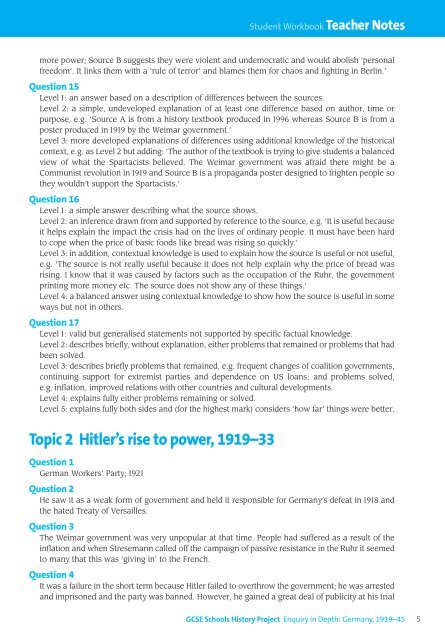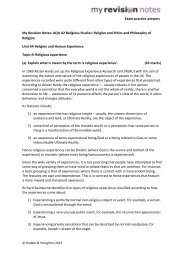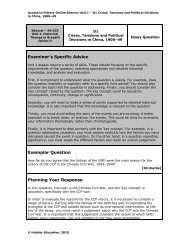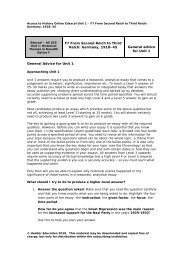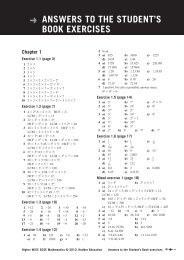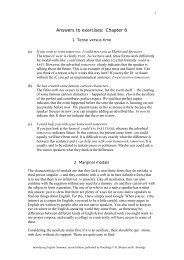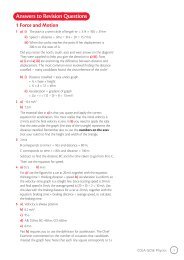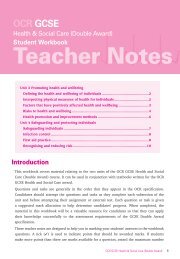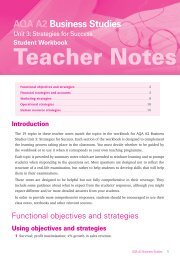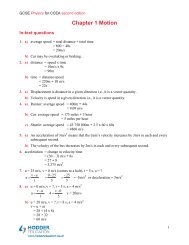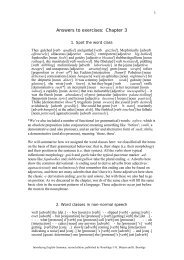GCSE Schools History Project Enquiry in Depth - Hodder Plus Home
GCSE Schools History Project Enquiry in Depth - Hodder Plus Home
GCSE Schools History Project Enquiry in Depth - Hodder Plus Home
Create successful ePaper yourself
Turn your PDF publications into a flip-book with our unique Google optimized e-Paper software.
Student Workbook Teacher Notesmore power; Source B suggests they were violent and undemocratic and would abolish ‘personalfreedom’. It l<strong>in</strong>ks them with a ‘rule of terror’ and blames them for chaos and fight<strong>in</strong>g <strong>in</strong> Berl<strong>in</strong>.’Question 15Level 1: an answer based on a description of differences between the sources.Level 2: a simple, undeveloped explanation of at least one difference based on author, time orpurpose, e.g. ‘Source A is from a history textbook produced <strong>in</strong> 1996 whereas Source B is from aposter produced <strong>in</strong> 1919 by the Weimar government.’Level 3: more developed explanations of differences us<strong>in</strong>g additional knowledge of the historicalcontext, e.g. as Level 2 but add<strong>in</strong>g: ‘The author of the textbook is try<strong>in</strong>g to give students a balancedview of what the Spartacists believed. The Weimar government was afraid there might be aCommunist revolution <strong>in</strong> 1919 and Source B is a propaganda poster designed to frighten people sothey wouldn’t support the Spartacists.’Question 16Level 1: a simple answer describ<strong>in</strong>g what the source shows.Level 2: an <strong>in</strong>ference drawn from and supported by reference to the source, e.g. ‘It is useful becauseit helps expla<strong>in</strong> the impact the crisis had on the lives of ord<strong>in</strong>ary people. It must have been hardto cope when the price of basic foods like bread was ris<strong>in</strong>g so quickly.’Level 3: <strong>in</strong> addition, contextual knowledge is used to expla<strong>in</strong> how the source is useful or not useful,e.g. ‘The source is not really useful because it does not help expla<strong>in</strong> why the price of bread wasris<strong>in</strong>g. I know that it was caused by factors such as the occupation of the Ruhr, the governmentpr<strong>in</strong>t<strong>in</strong>g more money etc. The source does not show any of these th<strong>in</strong>gs.’Level 4: a balanced answer us<strong>in</strong>g contextual knowledge to show how the source is useful <strong>in</strong> someways but not <strong>in</strong> others.Question 17Level 1: valid but generalised statements not supported by specific factual knowledge.Level 2: describes briefly, without explanation, either problems that rema<strong>in</strong>ed or problems that hadbeen solved.Level 3: describes briefly problems that rema<strong>in</strong>ed, e.g. frequent changes of coalition governments,cont<strong>in</strong>u<strong>in</strong>g support for extremist parties and dependence on US loans; and problems solved,e.g. <strong>in</strong>flation, improved relations with other countries and cultural developments.Level 4: expla<strong>in</strong>s fully either problems rema<strong>in</strong><strong>in</strong>g or solved.Level 5: expla<strong>in</strong>s fully both sides and (for the highest mark) considers ‘how far’ th<strong>in</strong>gs were better.Topic 2 Hitler’s rise to power, 1919–33Question 1German Workers’ Party; 1921Question 2He saw it as a weak form of government and held it responsible for Germany’s defeat <strong>in</strong> 1918 andthe hated Treaty of Versailles.Question 3The Weimar government was very unpopular at that time. People had suffered as a result of the<strong>in</strong>flation and when Stresemann called off the campaign of passive resistance <strong>in</strong> the Ruhr it seemedto many that this was ‘giv<strong>in</strong>g <strong>in</strong>’ to the French.Question 4It was a failure <strong>in</strong> the short term because Hitler failed to overthrow the government; he was arrestedand imprisoned and the party was banned. However, he ga<strong>in</strong>ed a great deal of publicity at his trial<strong>GCSE</strong> <strong>Schools</strong> <strong>History</strong> <strong>Project</strong> <strong>Enquiry</strong> <strong>in</strong> <strong>Depth</strong>: Germany, 1919–455


